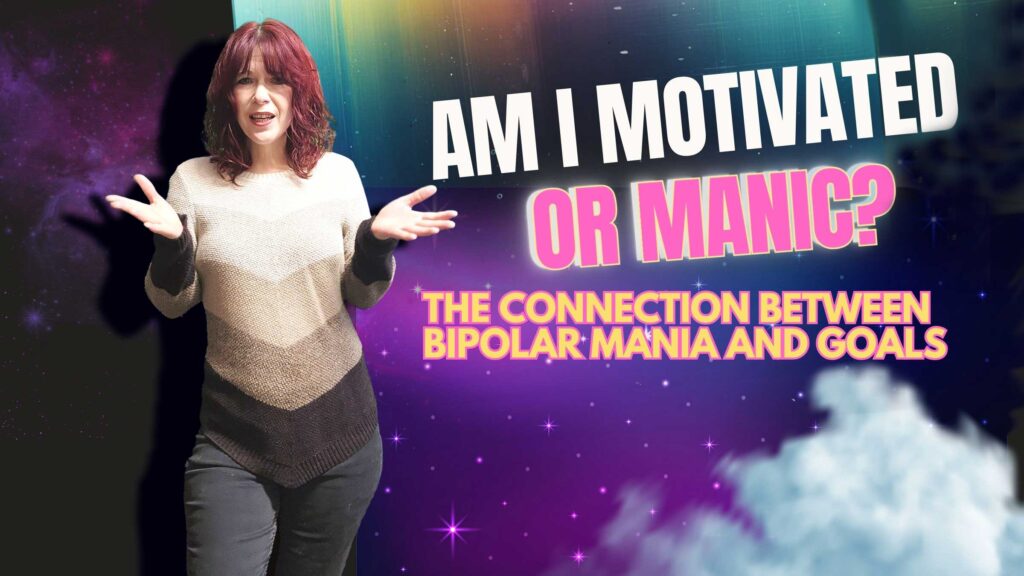Is there a connection between motivation and Bipolar Mania? Could goal setting trigger a manic episode? Let’s explore the link between goal setting and Bipolar Mania.
I love the feeling of being recharged and motivated to conquer a new goal. When I am feeling motivated, I have much more energy, creativity, and gumption. Unfortunately, sometimes my sense of motivation transitions from feeling fired up about something into an episode of Bipolar mania. (And, let me be a little more honest here, not sometimes – most of the time!)
My goal-setting episodes could easily be turned into a humorous commercial for a Bipolar mania medication. In fact, I have had friends tell me I saw this commercial and it made me think of you. Ha ha. But, it’s not so funny to be the poster child for bipolar mania.
If you have ever experienced a bipolar manic episode, you might know what I am talking about. You know how you suddenly decide to clean your whole house in one day? You start doing the dishes or cleaning the bathroom, something you need to do but have put off. But then you can’t stop… and by the time you’re done, you’ve done nothing but clean for 8 hours (or 3-straight days).
If you have Bipolar Disorder, you probably know what I am talking about and have experienced “motivation” episodes like this of your own. Where does this motivation come from and how do you know if you’re motivated or manic?
Is there a connection between goal setting and bipolar mania?
Ever since I was diagnosed with Bipolar Disorder I have struggled with evaluating my own mental state. Am I making a good decision or is my sudden wittiness, flirtatiousness, sexuality, charm, or motivation really just a sign that my Bipolar mania is on its way?
I made a video called, Is Bipolar Mania a Super Power? In that video, I talked about how much more successful I was when I was tapping into my manic energy. I have always felt like mania was my “gift” and the up-side of having Bipolar Disorder. People who don’t have Bipolar Disorder though, don’t see it that way. Instead, they seem to be fascinated, annoyed, distressed, or entertained by our episodes of Bipolar mania.
When I started working on writing about the topic of motivation and Bipolar Disorder, I planned to discuss Bipolar Disorder and extreme goal-setting. Why do so many of us want to be rich and famous? Why do we want to be perfect at everything? Bipolar people are often the A-students, the entrepreneurs, the musicians, the writers, the eating-disordered, and the crazy go-getters who do stuff other people don’t. But, why?
We aren’t like other people. That is part of why we chase after extreme goals, but also why our motivation, goal setting and bipolar mania tend to go together.
I started asking myself why. Why am I utterly obsessed with goal setting? Why can’t I ever be happy? Why am I such a perfectionist? As I started researching Bipolar mania and motivation, I started connecting the dots between my motivation, mania, and depression.
While other people were enjoying their lives — paying full attention to whatever movie they were watching, chilling out listening to music, or enjoying having some drinks with friends guilt-free, I was living in my own extreme goal-setting hell. I was always working on my next big thing, biting off more than I could chew, chasing the perfect body, overfilling my schedule, and then feeling completely depressed when I failed at my extreme goals (that by the way nobody else cares about but me).
If this sounds remotely familiar to you, keep reading or watch this week’s video. This is what I am talking about today — why Bipolar people are so goal-driven and how and why our motivation often triggers Bipolar mania…
Why People with Bipolar Disorder Are Driven to Succeed
When most people think about Bipolar Disorder, they picture a mentally unstable person. However, there’s another side of Bipolar Disorder. People with Bipolar Disorder can be some of the most motivated and ambitious people on earth. Think about your favorite, celebrity, athlete, or millionaire. How many people can you think of who are successful and are also a little Bipolar?
We are not always low-functioning. Many of us are quite the opposite. We are the high achievers who excel at crushing big and crazy goals. Could Bipolar Disorder be our secret? Can we use Bipolar mania to our advantage when it comes to goal setting or should we always try to reign in our “superpower”? Let’s talk about what makes us so driven to succeed at our goals. It has to do with how our brains are wired.
Bipolar People are High Achievers Early On
If you have Bipolar Disorder there’s a good chance that you’re also self-motivated, goal-driven, and a high achiever. Our minds are fantastic and many of us are intelligent or gifted. Some researchers think academic success in school could even be a predictor of Bipolar Disorder. A study conducted in Sweden looked at academic data from 700,000 adults and found that those who had high grades in school were 4 times more likely to develop Bipolar Disorder in adulthood.
Interestingly, the study also revealed that kids with low grades were more likely to develop Bipolar Disorder compared to those with average grades. However, this study suggests a potential connection between Bipolar Disorder and a specific type of motivation called approach motivation. Other studies on students have also found that ambitious goal-setting may be a risk factor for developing Bipolar Disorder.
Our Bipolar Brain is Hard-Wired for Extreme Goal-Setting
If you know anyone who’s bipolar, you’ve probably heard us talk about our big ideas or listened to us go on and on with overconfidence about whatever “pretentious” goal we are planning out in our heads. We may be obsessed with a project, or come up with one new business idea after another, constantly changing our minds about what we want to do next.
We love new ideas and goal setting. Although we don’t always follow through on our ambitious ideas, we love challenges – the bigger, the better and we are not afraid of taking risks. We thrive on risk-taking. If you tell us we can’t do it, or that’s impossible, we’ll probably tell you that’s what unsuccessful people say. Unfortunately, our mouths are often much bigger than our goals, motivation, and ability to follow through. Sometimes this causes us to take on unrealistic goals, that we aren’t ready for, or that are screaming “bad idea!”
Our goals are deeply connected with our sense of self-worth, purpose, and happiness. Achieving our goals can sometimes become an obsession. Completing a goal matters more to us than to others, and falling short of our goals significantly impacts our moods. This is why we can get stuck on a goal if we don’t achieve it, unable to let it go or move on – and also why we can get obsessed with a person we “can’t get”.
We aren’t content or complacent people. We always have to be working towards some type of extreme goal or we feel unfulfilled. It’s not just our ego or grandiose thinking. It’s part of how our brain works.
The Bipolar Brain: Behavioral Activation and Inhibition Systems
Researchers think our attraction to goal-setting and achieving extreme goals is due to our response to rewards and punishments. The part of our brain that regulates how we respond to rewards seems to be hyperactive, while the part of our brain that responds to punishment (or negative consequences) is not.
To understand what happens in our brains, it helps to understand the underlying mechanisms that cause this. There are two systems in our brain that help us regulate our motivation – the behavioral activation system and the behavioral inhibition system. The behavioral activation system is responsible for getting us moving or taking an action. The behavioral inhibition system is responsible for telling us not to take an action. The behavioral activation system and behavioral inhibition system work together like the little angel and devil on your shoulders. Do it? Or don’t do it? These are the parts of our brain that help us determine whether to pursue a goal or avoid it – our risk and reward systems.
Bipolar people tend to have a hypersensitive behavioral activation system. We may get more easily stimulated to take an action but we don’t seem to get the message from our behavioral inhibition system to not take an action. Like, Hello, brain. This is a bad idea!!! You should tell us not to do it.
This is why we go into a goal head-on without worrying about the possible negative outcomes of our decisions. Our brain’s behavioral activation system tells us — Take an action, take an action, take an action. You can do it, baby! The cheerleader in our brains is a little more excited than she is in other people’s brains.
Bipolar people are motivated by approach motivation rather than avoidance motivation. In other words, we’re driven by positive rewards rather than fearing negative consequences. This is why we may work for something we want, but you won’t motivate us to stop doing something based on a negative consequence.
Approach motivation is another word for goal-oriented motivation, and generally means working towards a positive reward for our effort. In general, human beings tend to approach positive experiences and avoid negative ones. Our brain is designed to get us to take action toward something beneficial or pleasurable (like eating or having sex) and to keep us from doing things that are painful or risky.
However, people with Bipolar disorder tend to have an imbalance of approach and avoidance motivation. This is what makes us fearless risk-takers. Our fearlessness can sometimes help us achieve our goals, but it can also lead to bad decisions and financial issues. Since our brain’s caution signal isn’t as strong as the one that encourages us to go for it, we can make poor decisions when it comes to goal-related decisions.
We also prefer extrinsic goals like fame and money, over intrinsic goals like inner peace, emotional stability, or better relationships. This is partly because our brain doesn’t receive as much of a pleasure response from intrinsic goals.
Extreme Goal Setting and Bipolar Mania: The Reality
When it comes to our Bipolar goals, our friends and family often believe that we just get excited about our fun new ideas but aren’t willing or capable of consistently putting in the work to achieve our goals. This isn’t always true. If we are high-functioning, we are often workaholics (at least when we are manic) and will work until we burn out or have an episode of depression.
Many of us are also entrepreneurs because of our ambitious nature. Ironically, we may be better suited for the entrepreneur life than others because of our familiarity with dealing with highs and lows.
Although we may struggle with maintaining the focus and stability needed to achieve long-term goals, many of us are capable of accomplishing our intense or demanding goals. But, it helps if we take a mindful and strategic approach to goal-setting by being self-aware of our limitations and accommodating for our energy changes.
Am I Manic or Motivated?
We’re highly motivated people, especially during our manic episodes. However, our disorder can make it difficult for us to objectively evaluate whether or not we have a brilliant idea or if we’re just having another manic episode. Our “nothing is impossible” mindset has its advantages, but bipolar mania can make it difficult for us to make prudent decisions.
There are several theories about what causes and triggers manic episodes. While we know a lot about what goes on in the brain during a manic episode, bipolar mania isn’t a simple biological process. Our lifestyle, routines, and behavior directly influence our moods.
When you are bipolar, having a consistent daily routine is extremely important. Changes in our daily routine, particularly with our sleep routine, can trigger a manic episode. However, there’s another trigger we have to watch out for and that is our desire to achieve a goal.
Goal Setting Can Trigger Bipolar Mania.
For us, motivation and mania tend to go together. When we experience Bipolar mania, our motivation surges, and when we’re motivated, it can sometimes push us into a manic state. It’s a little of a chicken-and-egg situation. Regardless of which comes first, the goal or the mania, the result is often the same. We tend to take on too much during our manic episodes, believing we can accomplish far more than we realistically can. Then, when we push ourselves to meet our objective, this can turn our motivation into mania.
Goal Setting and Bipolar Mania: Things to Watch Out for

Now that you know a little bit more about why we are wired for goal-setting, let’s talk about things to watch out for if you have Bipolar Disorder. Goals are awesome, and I love achieving my goals, but there are some things you need to work into your game plan if you want to achieve a big, bad, audacious goal without completely spiraling into a manic-depressive cycle. The most important thing to factor into your plan is your fluctuating energy levels and your need for a daily routine.
Goal-Setting Can Trigger a Manic Episode
Our behavioral activation system plays a key role in getting us up and moving – it’s like the engine that drives us to do things. When we’re dedicated to accomplishing a goal, this system gives us the inertia we need to work on it.
What’s fascinating is that the same system responsible for giving us the push to work on our goals also revs up our physical activity. Think of it like a “green light go” signal in our brains. This additional burst of energy manifests in increased physical activity, not just mental motivation, which researchers have detected using actigraphy monitoring.
When our behavioral activation system is in action, it reflects in our physical movement, and this increase in activity can be a prodromal symptom of bipolar mania. What this means for us is that just thinking about an idea or a goal we want to achieve, may trigger a response in our brains leading to physical symptoms, including more motor activity or disruption of our sleep. While this may give us the extra energy to dive into our goals, it can also trigger a manic episode.
We Can Get Obsessed With or Stuck on a Goal
Another common issue for people with Bipolar Disorder is that we become overly fixated on a goal, even when it no longer makes sense or benefits us. This tendency to not let go of a goal is linked to our hyperactive behavioral activation system, which fuels our strong motivation for reward-based goals.
Once we’ve experienced some form of reward from pursuing a goal, we can become trapped in the need to keep pursuing it, even if it no longer brings rewards. Our brain remains locked onto that goal, like a traffic light stuck on green, and we might stick with it even when we haven’t had any recent success or the original reward from it has passed.
Our hyperactive behavioral activation system can sometimes trap us into holding onto a goal that we should let go of. You’ve probably heard the saying, “Winners never quit, and quitters never win.” That could be our motto.
There are times when it’s necessary (and better) to let go of a goal that no longer serves us. When we relentlessly pursue a goal, it can lead to burnout and for many of us, failing at a goal can trigger extreme depression. Unfortunately, it is incredibly hard for us to abandon our goals because our brain associates it with a positive reward (even when we intellectually know we should let it go).
We struggle with Overcommitment
When we feel motivated (even if we are not manic) we tend to have a lot more energy to get things done. Like most people, we feel better when we are motivated and productive. It’s unfortunately difficult for us to determine whether we are motivated or beginning a manic episode.
When we have manic motivation our energy seems sustainable. We often take on more than we can realistically keep up with. Eventually, though, our manic energy runs out. And when it does, we can’t keep up with the amount of work we’ve overcommitted to. This leads to stress, physical symptoms, burnout, and depression.
To make sure that you don’t overcommit, lighten your workload before you start working on a new goal. Ease into things by budgeting the time to take on something new. Don’t just jump into something because you feel motivated.
Sure, we can accomplish a lot when we’re in a manic state, but it’s crucial to pace yourself and set realistic, achievable goals when you have Bipolar Disorder. Being realistic doesn’t mean you have to aim small. You can absolutely crush big goals with Bipolar Disorder, but you have to be mindful of your mental health when you set goals.
Goal Setting Affects Our Relationships
No matter how you approach things, goal setting can affect your mood and your relationships. Our friends, family, and loved ones have to deal with the highs and lows that go along with our ambitious or obsessive goal-setting. Our manic motivation may feel wonderful to us, but it may overwhelm or annoy the people around us. Additionally, when we get our mind set on achieving a goal, and don’t achieve it, we can have issues with resentment, anger, rage, and irritable moods. This can be difficult for the people around us to deal with.
Even when we do accomplish our goals, we can be hard to be around. Once the manic high wears off, we get depressed and that is also hard for our loved ones to watch. The more often we repeat our goal-related patterns, the more we reinforce the neural pathways that reward our brain with dopamine for accomplishing our goals.
To change how we are wired, we can use mindfulness practices to reprogram our minds to seek inner peace and emotional stability as a goal, instead of just reward-driven goals. We can prioritize self-care, stronger relationships, and better moods over extreme goals, extreme pressure, and extreme expectations. We can give ourselves more time, flexibility, and self-love when it comes to reaching our goals.
How to Crush Your Goals When You Have Bipolar Disorder
When you have Bipolar Disorder you have to approach goal-setting and your extreme goals differently than other people. Having powerful motivation can be a huge advantage for us. We are often the energizer bunnies who know how to get things done. But, there’s a flip side to this. We can go after something so hard that we crash and burn. Or, we can make impulsive financial decisions that affect not only us but the people who love us.
However, with the right strategy, you can channel your high energy into achieving remarkable results without triggering a manic episode. Let’s talk about some tips for doing it.
Keep Your “Manic” Goals to Yourself
There is a ton of advice about goal-setting. People may tell you that if you want to be successful you have to shout your goals from the rooftops and tell everyone you know. Some people believe that making your goals public will help keep you accountable. There’s some truth to this, but if you have Bipolar Disorder you might want to think twice about sharing your goals with people.
When we openly share our ambitious goals, sometimes our friends and family can get in our way or take advantage of us. If you want to accomplish something big, it takes commitment and a tolerance for risk-taking which many people with Bipolar Disorder have. These can be assets when it comes to goal setting, especially for entrepreneurs. However, it may not be something your friends, family, or partner handle well. This is one reason it’s better to keep major goals to yourself or a small circle of close friends.
If you’re dreaming up a major life goal, you may need support or someone to bounce ideas off of. Consider sharing your goals and ideas only with those closest to you. You need a good support system, not a huge circle of people who might discourage you, influence your decisions, or take advantage of you.
Sleep on it!
When a new goal or idea pops into your head, before you jump in with both feet, sleep on it. Bipolar Disorder can cause us to act impulsively without thinking things through. We often make a quick decision and then greenlight go with it. When we are manic it’s difficult for us to be objective about our state of mind and our ideas. What might sound like a brilliant idea during a manic episode, may not sound so incredible once we come down from the mania. This is why I have made it a habit to sleep on all of my decisions and talk things over with an objective person before I take any action.
Save for It
When you’re considering a financial decision that’s related to a goal, it is imperative that you save up for it. We often struggle with responsible decision-making when it comes to finances, so make this tip a rule. Even if you have an excellent idea, avoid making impulsive or financially risky choices.
If you have a big goal in mind—whether it’s launching a new business, joining an expensive gym, or planning a major trip—take the time to save up for it. This approach will safeguard you against unwise financial decisions and ensure that you’re fully committed to your goal when you decide to take action.
Intentionally Slow Things Down
Going slow is not in our nature. We are wired to get things done and that generally means as fast as we can. We want to win. We want to be the best. And, we don’t want to do it at a slow pace. But, setting a realistic pace will help you to prevent the manic-depression cycles that often co-occur with goal setting. It will also keep you from overcommitting and burning out.
Thus, when you plan your goals, intentionally give yourself more time to complete them. This will ensure that you make realistic goals. When I set a goal, I give myself three times more time than I think it will take. This helps me to set a more realistic pace that doesn’t trigger mania.
Set Softer Deadlines
When I don’t keep up with deadlines I have set for myself, it can cause me to overwork, put extra pressure on myself, and get into rages. If your bipolar girlfriend is in a bad mood all the time, this might be why.
One of the things I have learned to do is set softer deadlines. For example, instead of committing to making one YouTube video every Tuesday, I have committed to making at least one a month. This gives me a little flexibility with my goals and keeps me from pushing myself into mania or burnout.
Create Your Own Stoplights
The next big thing most of us need to learn is how to pause. One of our biggest obstacles, believe it or not, is that we don’t stop. We don’t have an internal stoplight that signals us to stop or tells us it’s time to take a break. It’s important, however, to remember that you can resume your goal-crushing efforts tomorrow.
We don’t naturally pace ourselves or take breaks, so we need to establish routines and mechanisms to remind us to stop. One thing I do to help me remember to take breaks or stop working at the end of the day is I set alarms. I used to push myself to work around the clock until I completed a task even if I was exhausted, but I’ve learned that taking breaks helps me prevent manic episodes, avoid burnout, and actually be more productive.
We all need mental breaks to renew our creative energy, but if we have Bipolar Disorder we may need to create these breaks. If you’re like me and you work on something until it’s done, consider changing your approach by incorporating designated stopping points in your day, whether or not you’ve completed your goals.
Practice Mindfulness
I meditate and practice mindfulness regularly. My meditation practice is my biggest tool for calming down and staying mentally stable. My main goal in my own life right now is emotional stability. I have taken time to evaluate my big goals and what drives them. What’s more important to me, having money, a great body, and a spotless house? Or having good relationships with my children, my partner, and my family? For me, breaking the habit of extreme goal-setting has led to a more peaceful and happier existence. I still have ambitious goals, but I prioritize my mental stability and the quality of my relationships.
How Does Goal Setting Affect Your Bipolar Disorder?
If you have Bipolar Disorder, do you find yourself chasing extreme goals? How does your support network, including your friends and family, respond to this? I’d love to hear your thoughts on the tips and information I’ve shared. Did you find them helpful, or was there anything you relate with or you’d like me to talk about more?
Resources
Academic performance and expectations for the future in relation to a … (n.d.). https://www.researchgate.net/publication/223514048_Academic_performance_and_expectations_for_the_future_in_relation_to_a_vulnerability_marker_for_bipolar_disorders_The_hypomanic_temperament
Bipolar risk greater for Bright Children. NICS Well. (n.d.). https://www.nicswell.co.uk/health-news/bipolar-risk-greater-for-bright-children
Johnson, S. L., & Carver, C. S. (2006). Extreme goal setting and vulnerability to mania among undiagnosed young adults. Cognitive therapy and research. https://www.ncbi.nlm.nih.gov/pmc/articles/PMC2829854/
Johnson, S. L., Edge, M. D., Holmes, M. K., & Carver, C. S. (2012a). The behavioral activation system and Mania. Annual review of clinical psychology. https://www.ncbi.nlm.nih.gov/pmc/articles/PMC3409638/
Johnson, S. L., Edge, M. D., Holmes, M. K., & Carver, C. S. (2012b). The behavioral activation system and Mania. Annual review of clinical psychology. https://www.ncbi.nlm.nih.gov/pmc/articles/PMC3409638/
Moss, D. S. (2016, May 22). Sicotests. / Dr Simon Moss / -. https://www.sicotests.com/newpsyarticle/Approach-and-avoidance-motivation
Scholten MR;van Honk J;Aleman A;Kahn RS; (n.d.). Behavioral inhibition system (BIS), behavioral activation system (BAS) and schizophrenia: Relationship with Psychopathology and Physiology. Journal of psychiatric research. https://pubmed.ncbi.nlm.nih.gov/16643947/
Summary, A. GoodTherapy. org N. (2011, November 29). GoodTherapy.org. GoodTherapy. https://www.goodtherapy.org/blog/goal-setting-may-predict-bipolar-manic-episodes-1129111/











